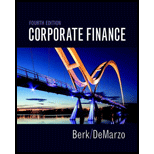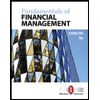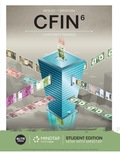
Corporate Finance (4th Edition) (Pearson Series in Finance) - Standalone book
4th Edition
ISBN: 9780134083278
Author: Jonathan Berk, Peter DeMarzo
Publisher: PEARSON
expand_more
expand_more
format_list_bulleted
Concept explainers
Question
Chapter 10, Problem 5P
a)
Summary Introduction
To determine: Whether there is a difference in
Introduction:
Capital yield refers to the change in the value of investment stated in terms of percentage.
b)
Summary Introduction
To determine: Whether there is a difference in dividend yield when the stock price falls and its reason.
Introduction:
Dividend yield refers to the percentage of the initial price of the share received as a dividend.
Expert Solution & Answer
Want to see the full answer?
Check out a sample textbook solution
Students have asked these similar questions
What is the significance of a company’s price-to-earnings (P/E) ratio?
What is the significance of a company’s price-to-earnings (P/E) ratio?need help
What is quantitative easing in finance?
Chapter 10 Solutions
Corporate Finance (4th Edition) (Pearson Series in Finance) - Standalone book
Ch. 10.1 - For an investment horizon from 1926 to 2012, which...Ch. 10.1 - For an investment horizon of just one year, which...Ch. 10.2 - Prob. 1CCCh. 10.2 - Prob. 2CCCh. 10.3 - How do we estimate the average annual return of an...Ch. 10.3 - Prob. 2CCCh. 10.4 - Prob. 1CCCh. 10.4 - Do expected returns of well-diversified large...Ch. 10.4 - Do expected returns for Individual stocks appear...Ch. 10.5 - What is the difference between common risk and...
Ch. 10.5 - Prob. 2CCCh. 10.6 - Explain why the risk premium of diversifiable risk...Ch. 10.6 - Why is the risk premium of a security determined...Ch. 10.7 - What is the market portfolio?Ch. 10.7 - Define the beta of a security.Ch. 10.8 - Prob. 1CCCh. 10.8 - Prob. 2CCCh. 10 - The figure on page informalfigure shows the...Ch. 10 - Prob. 2PCh. 10 - Prob. 3PCh. 10 - Prob. 4PCh. 10 - Prob. 5PCh. 10 - Prob. 6PCh. 10 - The last four years of returns for a stock are as...Ch. 10 - Prob. 9PCh. 10 - Prob. 10PCh. 10 - Prob. 11PCh. 10 - How does the relationship between the average...Ch. 10 - Consider two local banks. Bank A has 100 loans...Ch. 10 - Prob. 21PCh. 10 - Prob. 22PCh. 10 - Consider an economy with two types of firms, S and...Ch. 10 - Prob. 24PCh. 10 - Explain why the risk premium of a stock does not...Ch. 10 - Prob. 26PCh. 10 - Prob. 27PCh. 10 - What is an efficient portfolio?Ch. 10 - What does the beta of a stock measure?Ch. 10 - Prob. 31PCh. 10 - Prob. 32PCh. 10 - Prob. 33PCh. 10 - Suppose the risk-free interest rate is 4%. a. i....Ch. 10 - Prob. 35PCh. 10 - Prob. 36PCh. 10 - Suppose the market risk premium is 6.5% and the...Ch. 10 - Prob. 38P
Knowledge Booster
Learn more about
Need a deep-dive on the concept behind this application? Look no further. Learn more about this topic, finance and related others by exploring similar questions and additional content below.Similar questions
arrow_back_ios
SEE MORE QUESTIONS
arrow_forward_ios
Recommended textbooks for you
 Managerial AccountingAccountingISBN:9781337912020Author:Carl Warren, Ph.d. Cma William B. TaylerPublisher:South-Western College Pub
Managerial AccountingAccountingISBN:9781337912020Author:Carl Warren, Ph.d. Cma William B. TaylerPublisher:South-Western College Pub Survey of Accounting (Accounting I)AccountingISBN:9781305961883Author:Carl WarrenPublisher:Cengage Learning
Survey of Accounting (Accounting I)AccountingISBN:9781305961883Author:Carl WarrenPublisher:Cengage Learning Fundamentals of Financial Management, Concise Edi...FinanceISBN:9781305635937Author:Eugene F. Brigham, Joel F. HoustonPublisher:Cengage Learning
Fundamentals of Financial Management, Concise Edi...FinanceISBN:9781305635937Author:Eugene F. Brigham, Joel F. HoustonPublisher:Cengage Learning Intermediate Financial Management (MindTap Course...FinanceISBN:9781337395083Author:Eugene F. Brigham, Phillip R. DavesPublisher:Cengage Learning
Intermediate Financial Management (MindTap Course...FinanceISBN:9781337395083Author:Eugene F. Brigham, Phillip R. DavesPublisher:Cengage Learning
 Cornerstones of Financial AccountingAccountingISBN:9781337690881Author:Jay Rich, Jeff JonesPublisher:Cengage Learning
Cornerstones of Financial AccountingAccountingISBN:9781337690881Author:Jay Rich, Jeff JonesPublisher:Cengage Learning

Managerial Accounting
Accounting
ISBN:9781337912020
Author:Carl Warren, Ph.d. Cma William B. Tayler
Publisher:South-Western College Pub

Survey of Accounting (Accounting I)
Accounting
ISBN:9781305961883
Author:Carl Warren
Publisher:Cengage Learning

Fundamentals of Financial Management, Concise Edi...
Finance
ISBN:9781305635937
Author:Eugene F. Brigham, Joel F. Houston
Publisher:Cengage Learning

Intermediate Financial Management (MindTap Course...
Finance
ISBN:9781337395083
Author:Eugene F. Brigham, Phillip R. Daves
Publisher:Cengage Learning


Cornerstones of Financial Accounting
Accounting
ISBN:9781337690881
Author:Jay Rich, Jeff Jones
Publisher:Cengage Learning